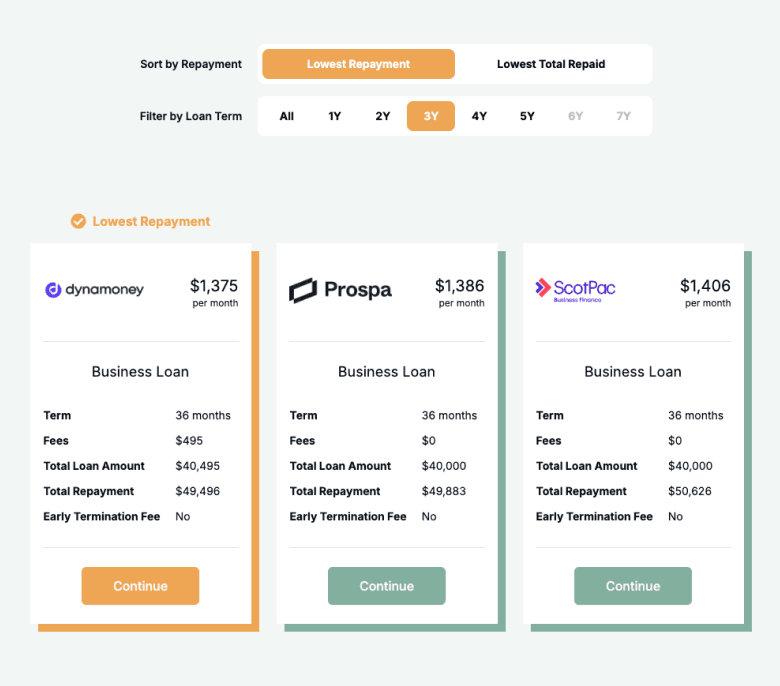Compare Invoice Finance from 50+ Australian Lenders
Unlock cash tied up in unpaid invoices. Access funds fast with flexible factoring or discounting options tailored to your business.
5.0 rating


Invoice Finance Made Simple
Free up working capital by turning unpaid invoices into cash. Ideal for Australian SMEs managing long payment cycles or seasonal fluctuations.
Advance up to 90%
Access up to 80–90% of invoice value upfront
Fast Cash Flow
Funds released within 24–48 hours of invoice verification
Flexible Facility
Choose between factoring or discounting
B2B Friendly
Best for businesses trading on credit terms
Tailored Pricing
Rates vary based on customer creditworthiness
Growth Ready
Funding grows as your sales ledger grows
How it works
We connect you with invoice finance providers across Australia so you can unlock working capital quickly and flexibly.
Apply online
Submit a simple application with details of your outstanding invoices and trading history.
Get matched
Our Lender Match technology connects you with invoice finance options including factoring and discounting.
Choose your facility
Select the provider and structure that suits your cash flow needs.
Access your funds
Receive up to 90% of your invoice value within 24–48 hours, with balance paid on settlement.

A quick guide to invoice finance
Invoice finance—sometimes called accounts receivable finance—lets businesses unlock capital tied up in unpaid invoices. Instead of waiting 30, 60 or 90 days for customers to pay, you can receive up to 90% of invoice value upfront.
There are two main types: factoring, where the financier manages collections, and discounting, where you stay in control of your ledger. Either way, once your customer pays, the balance (minus fees) is released.
This solution is particularly valuable for Australian SMEs in industries like wholesale, recruitment, transport and manufacturing, where customer payment terms are often lengthy. It improves liquidity, reduces cash flow stress, and helps fund ongoing operations or growth opportunities without adding extra debt to the balance sheet.
Want to skip ahead?
This guide is broken down into the following sections. Click a link if you want to skip ahead.
Types of invoice finance
Invoice finance comes in two main forms, each suited to different business needs:
What can I use invoice finance for?
Invoice finance gives you the flexibility to reinvest cash flow where it matters most:
Boosting Cash Flow
Cover wages, rent and supplier invoices without waiting for customers to pay.
Expanding Operations
Fund growth projects like opening new sites or entering new markets.
Purchasing Inventory
Secure bulk stock, seasonal orders, or supplier discounts upfront.
Paying Suppliers
Strengthen relationships by paying suppliers on time—or even early.
Investing in Equipment
Upgrade machinery or technology without draining reserves.
Managing Seasonal Fluctuations
Balance out low-sales months with steady access to cash flow.
Hiring Staff
Add new employees or fund temporary staff for busy periods.
Marketing & Advertising
Invest in campaigns to drive growth without waiting on invoices.
Unexpected Expenses
Handle urgent repairs or costs with confidence and liquidity.
Debt Consolidation
Use invoice finance to simplify debts into one manageable facility.
Case Study

Liam Roberts, Roberts Wholesale Supplies
Keeping Cash Flow Steady with Invoice Finance
Industry: Wholesale
Challenge: Long 60-day payment terms causing strain on working capital.
Solution: Invoice discounting facility advancing 85% of invoice value within 24 hours.
Liam runs a wholesale distribution business supplying independent retailers. With customers on 60-day payment terms, he often struggled to pay suppliers and staff while waiting for invoices to clear. By using invoice discounting, he accessed 85% of invoice value upfront and maintained control of his ledger. This provided reliable cash flow to pay suppliers promptly, take advantage of early-payment discounts, and fund new stock orders without stress.
How much can I borrow with invoice finance?
In Australia, lenders typically advance 80–90% of your verified invoice value upfront. If you have $100,000 in unpaid invoices, you could receive $80,000 to $90,000 immediately, with the balance (less fees) paid when your customer settles.
Your borrowing capacity grows with your sales ledger. The stronger and more reliable your customer base, the more funding you can unlock.
Invoice Finance Calculator
Estimate how much working capital you can unlock from unpaid invoices.
Balance over time
Am I eligible for invoice finance?
Eligibility depends more on your customers’ creditworthiness than your own, since they are the ones paying the invoices. Strong debtor reliability improves approval odds and advance rates.
You may be eligible if you are:
An Australian business with B2B invoices
Over 18 years old
Trading for at least 6 months
Minimum monthly turnover of $10,000
Invoices issued on standard credit terms (30–90 days)
How to apply for invoice finance?
Apply online and share details of your sales ledger and outstanding invoices. We’ll match you with multiple providers so you can compare facilities, pricing and advance rates. Once approved, funds can be released within 24–48 hours.
Documents you may need:
ABN and GST registration details
Photo ID (passport or driver’s licence)
Outstanding invoices to creditworthy customers
Recent business bank statements
How to save money with invoice finance
The key to saving money is comparing advance rates and fees across lenders. Some providers charge only a service fee, while others add interest on outstanding balances. Understanding these structures is essential.
You can also save by using selective invoice finance, where you only fund specific invoices instead of your entire ledger. This reduces costs while still improving liquidity when you need it most.
Finally, negotiating early payment discounts with suppliers—funded through invoice finance—can offset facility fees, turning the service into a net positive for your business.
Understanding invoice finance options
Invoice finance can be structured in several ways depending on how much control you want over collections, who carries the risk of non-payment, and how flexible you need the facility to be:
Factoring vs Discounting
In invoice factoring, the financier manages collections directly from your customers. In invoice discounting, you retain control of your sales ledger and handle collections yourself. The right option depends on whether you prefer outsourced collections or keeping customer relationships in-house.
Recourse vs Non-Recourse
Recourse agreements make your business responsible if a customer doesn’t pay, while non-recourse transfers that risk to the financier. Non-recourse provides more protection but usually costs more, whereas recourse can be more affordable if your debtors have strong payment histories.
Selective vs Whole Ledger
Some lenders allow you to choose specific invoices to finance (selective), while others require financing your entire debtor book (whole ledger). Selective options offer flexibility for short-term cash gaps, while whole ledger agreements often provide better rates and higher limits.
Fixed Fees vs Percentage of Invoices
Repayment costs can be structured as a flat fee per invoice or a percentage of the invoice value. The right structure depends on your average invoice size, frequency, and whether you need predictable costs or variable pricing.
Testimonials
Verified Review
Eujin was extremely easy to work with. He was respectful, clear in communication and persuasive. He works to get the best deal for his clients.
Chetan P.
Verified Review
Brad was amazing to deal with — he went above and beyond in helping us with our funding needs. I highly recommend him to anyone!
ROJO C.
Verified Review
Robyn was amazing the way she went through each step made it so easy to understand and having a joke along the way it was like chatting to a mate well done Robyn winner
Steve G.
Verified Review
Every problem that occurred during the approval process Evie found a solution. Anyone looking for a financial solution needs to have Evie on their side
Pat F.
Verified Review
Stevie was amazing she made the entire process smooth, not stressful and easy everything she requested wasn’t hard to complete, she worked around me she gave me advice or what to look for in a car she shared some good places to find a car she shared her experience with insurance she was amazing and went above and beyond. It isn’t always easy sharing things with someone when it comes to your personal affairs but she made me feel welcome to share you have a start worker and I really do believe she deserves a pay bonus
Tania W.
Verified Review
What a great bloke to deal with... Thank you Brad for all your help and making our dream a reality. We will be contacting you again shortly.
John Z.
Frequently Asked Questions
Invoice Finance FAQs
These helpful FAQs will help you find the answers you need. If you can't find what you're looking for, you can request a callback below.







































































